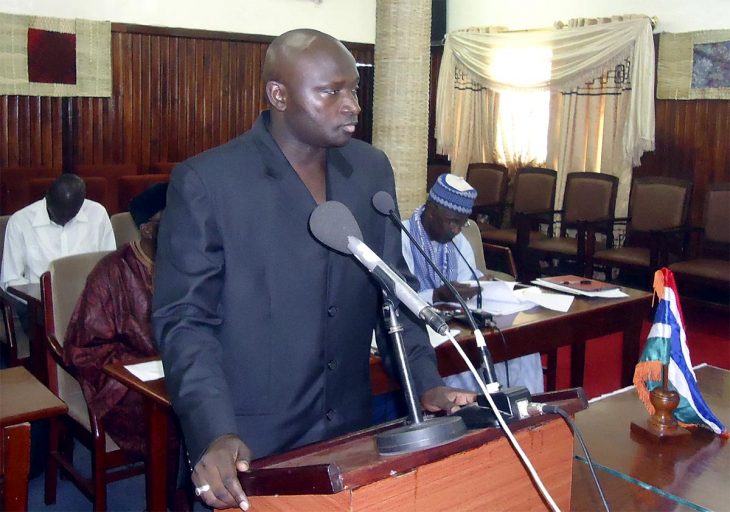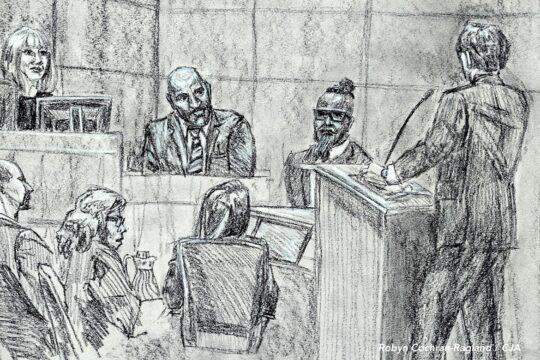Late July 2014, two and a half years before Gambia’s president Yahya Jammeh fell from grace and was forced into exile to Equatorial Guinea, he claimed on national television “dekabi ma ko mom” – “I own this country”, in the Wolof language. This was in a meeting with members of the Saudi-backed Supreme Islamic Council, Jammeh’s religious leaders who were in conflict with some of Gambia’s traditional scholars. The dispute was over which day Muslims were to observe Eid al-Fitr, a Muslim festivity after Ramadan. Jammeh said anyone who did not observe Eid al-Fitr on the date chosen by the Supreme Islamic Council and prayed on another day would be arrested.
Present at the meeting was Interior Minister Ousman Sonko. In a typical, emotional outburst, Jammeh threatened Sonko that he would visit his “hotel”, referring to Mile 2 Central Prison located at the outskirt of Banjul, if he did not arrest anyone who prayed on a day not endorsed by him.
Following the meeting, several individuals were arrested, including a prominent Gambian scholar, Sheikh Sheriff Muhideen Hydara. Charged with conspiracy to commit a felony and disobedience of lawful order, his trial lasted for more than nine months — from July 2014 to May 2015 — until judge Ebrima Jaiteh ruled that “no reasonable tribunal [could] secure conviction.” In January this year, Hydara’s eldest son claimed before the Truth, Reconciliation and Reparations Commission (TRRC) that his father’s humiliation and “illegal arrest” contributed to his death in 2019.
Direct and indirect cooperation
This is the kind of evidence produced before the TRRC that may be of interest to the Swiss judiciary. Indeed, since 2017 Ousman Sonko has been imprisoned in Switzerland where he is prosecuted for serious crimes allegedly committed under his authority in the Gambia.
Born in 1969, Sonko has been Jammeh’s longest serving Interior Minister, from 2006 to 2016. Sonko was a career military man who in early 2000 was serving as the commander of the State Guards Battalion, an elite force guarding the ex-Gambian dictator. He later left the army to be appointed as the Inspector General of the national police. Then he became a key cabinet member.
In 2016, when political tension and opposition protests heightened in Gambia Sonko and Jammeh fell out. The reasons remain unknown. But Sonko fled to Sweden, from where he moved, after an unsuccessful asylum request, to Switzerland. In January 2017, after Jammeh was forced into exile after 22 years in power, Sonko was arrested by Swiss authorities. A Swiss NGO TRIAL International had filed a complaint against him on the basis of human rights violations. Sonko is currently in pre-trial detention and his case is investigated by Switzerland’s Office of the Attorney General.
Meanwhile, hundreds of testimonies have been filed before the TRRC for a year and a half. And Sonko’s name has come up in several of them. “Gambia’s government through the office of the Ministry of Justice is cooperating fully with the Swiss authorities in Sonko’s case,” Gambia’s Attorney General Abubacarr Tambadou told Justice Info. TRIAL International said for its part it has transmitted “materials, including testimonies before the TRRC, to the Swiss Prosecutor”. According to Emeline Escafit, TRIAL International’s expert on Gambia, they “have been filing information based on our own investigation and information coming out of the Truth, Reconciliation and Reparation Commission has also been very valuable to our investigation and to the case. We hope that this will help the case to move forward.”
The man who was passing orders from Jammeh
“The TRRC is interested in Ousman Sonko,” said the Commission’s executive secretary Dr Baba Galleh Jallow. Jallow said investigations into Sonko and all adversely mentioned persons before the Commission are ongoing as the Commission strives to end its public hearing by October 2020. “I think it's a good thing that outside parties, whether judicial systems or other institutions, are following the TRRC's proceedings and finding them useful in their work. It goes to show that the TRRC is taken seriously around the world,” said Jallow. From the arrest of Hydara to the torture of Imam Ba Kawsu Fofana, Sonko is mostly named as someone passing orders from Jammeh to junior officers to execute.
On 14 April, 2016, opposition activist Ebrima Solo Sandeng and 15 other supporters from the United Democratic Party were arrested and jailed. They were protesting for “proper electoral reforms”. While in detention, Sandeng was reportedly tortured to death. Several of his colleagues were allegedly tortured. Among them was Fatou Camara. Camara appeared before the Truth Commission on October 25, 2019. Camara blamed Sonko for their maltreatment in Mile 2 Central Prison and their torture at the National Intelligence Agency.
Sonko’s name was also connected to the fate of Imam Ba Kawsu Fofana. In 2012, Fofana was arrested after several months of dispute between him on the one hand, and Jammeh and his clerics from the Supreme Islamic Council on the other hand. He was held incommunicado for nine days during which he was reportedly tortured. He then fled the country for Casamance, in the south of Senegal, where he lived until 2015 when he was allowed to return. He said while he was in detention, they broke his finger and that it was Sonko who told him during his interrogation, that his finger was broken on Jammeh’s orders. “About 10 people were part of those beating me with pipes as they covered my head with nylon bags”, said Fofana.
The killing of Lieutenant Manneh
One of the known loyalists of President Jammeh in the early days of his rule was Lieutenant Almamo Manneh. Before the Truth Commission, Manneh’s name came up in relation to several allegations of torture of political detainees in 1995 and 1996. However, in January 2000, Manneh’s time came to be at the receiving end of Jammeh’s wrath. He was accused of plotting with Lieutenant Landing Sanneh.
At the time Sanneh was the commander of the State Guards battalion and Manneh was his close friend, according to Lieutenant Lalo Jaiteh, the aide-de-camp to Jammeh at the time. Ousman Sonko was Sanneh’s second-in-command at the State Guards. Jaiteh, who currently lives in Switzerland, told the TRRC on September 26 that he submitted a deposition in Sonko’s case. He said that he was with president Jammeh in Kanilai, the former president’s home village, when Jammeh brought out a cassette which he said was recorded by Sonko. According to Jaiteh, the soldiers were discussing about plotting a coup.
In the audio recording, he recognized the voices of Sanneh and Manneh. Then Jammeh asked him to call his cabinet ministers and instructed him to put a team together to go and arrest Manneh and Sanneh. The arrest, Jammeh said, should be coordinated by Sonko. Within about an hour, Sonko returned. “I was terrified when Sonko told me [Manneh’s body] was in the trunk” of the vehicle, said Jaiteh. Sonko’s explanation was that Manneh had resisted arrest in his office and had shot at them. They had fired back, killing him. “I knew Almamo [Manneh] and he was a good soldier. For him to shoot at six people in a room and not wound anyone, that would be surprising. I did not believe Sonko’s story,” said Jaiteh. “I think Ousman Sonko had intentionally planned to kill Almamo Manneh.” The team later proceeded to arrest Landing Sanneh.
Sonko accused of sex slavery
But Jaiteh was not the only person who suspected Sonko to have killed Manneh. Manneh’s widow Binta Jamba also accused Ousman of killing her husband. And she also has issued a statement before the Swiss judiciary. On October 30, 2019, Jamba appeared before the TRRC. She said much more than just accusing Sonko of her husband’s death. She alleged that Sonko has made her a sex slave and that “has raped [her] over 60 times.”
The 51-year old mother who now lives in North Carolina, United States, said the former minister started harassing her from the time he was commander of the state guards to the time he was appointed Inspector General of Police and subsequently Interior Minister. Jamba was a lower ranking police officer. She recalled the first attempt by Sonko to rape her was at his office at the State House. In all these scenes, Sonko was always with a pistol. This terrified her, she said. “He held my hands and threw me on the bed.,” she said about one of their encounters.
The migrants massacre
Then there was evidence on the killing, in July 2005, of 54 West African migrants, mainly Ghanaians, who were summarily executed. While the order is said to have come from Yahya Jammeh, investigations by TRIAL International and Human Rights Watch published in May 2018 pointed out that Interior Minister Sonko was present at different meetings ahead of this incident. The migrants were caught in Barra, a coastal town separated from Gambia’s capital Banjul by a 7-mile river crossing. Witnesses said Sonko asked the Navy to transfer the migrants by boat from Barra to the Navy Headquarters in Banjul. One commander said that at least two of the high-ranking officials, Sonko and the ex-National Intelligence Agency director Daba Marenah, called Jammeh from the Naval Headquarters. Several former hitmen of ex-president Jammeh who testified before the TRRC have confessed to participating in the executions of West African migrants.
GAMBIA’S TRUTH COMMISSION SUBMITS INTERIM REPORT
Gambia’s Truth, Reconciliation and Reparations Commission on April 29 submitted its interim report to Justice Minister Abubacarr Tambadou. The interim report only covers the Commission’s activities during its first year of existence and does not contain any recommendation for prosecution at this stage. The TRRC’s mandate ends in 2020 with possibility of extension.
So far, the Commission has collected 462 statements from victims and witnesses of human rights violations. In total though, the TRRC’s victims support unit has registered 941 victims of various kinds of human rights violations and abuses. 217 witnesses have appeared before the Commission since the commencement of the public hearings on January 7, 2019. They include 40 alleged perpetrators and adversely mentioned persons, and 25 Gambians from the diaspora who testified via video.






